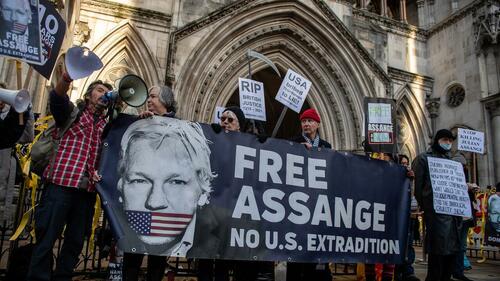"The order, which brings and end to the years’-long extradition battle closer, comes after the U.K. Supreme Court last month refused Assange permission to appeal against a lower court’s ruling that he could be extradited," The Associated Press reports.

"District Judge Paul Goldspring issued the order in a brief hearing at Westminster Magistrates’ Court, as Assange watched by video link from Belmarsh Prison and his supporters rallied outside the courthouse, demanding he be freed," the AP observed.
This means all that remains is for UK Home Secretary Priti Patel to rubber-stamp the transfer, coming after Assange has languished for years in London's Belmarsh maximum security prison, where he was sent in April of 2019, following UK police dragging him from the Ecuadorean embassy.
Crucially, Assange's legal team can still appeal the Wednesday extradition ruling, which will continue to the already long dragged out proceedings.
Axios notes, however, that "Assange still has legal options available to him, but the approval is a blow to his decadelong fight to avoid trial over U.S. charges of violating the Espionage Act and hacking government computers." He faces 175 years in prison if convicted - which would likely be served at a US federal supermax prison that his supporters say is tantamount to torture given the extreme isolation inmates experience.
The question of whether Assange faces extreme and cruel punishment if transferred to US custody has figured centrally in the legal debate, as the AP report reviews:
A British district court judge had initially rejected a U.S. extradition request on the grounds that Assange was likely to kill himself if held under harsh U.S. prison conditions. U.S. authorities later provided assurances that the WikiLeaks founder wouldn’t face the severe treatment that his lawyers said would put his physical and mental health at risk.
In December, the High Court overturned the lower court’s decision, saying that the U.S. promises were enough to guarantee that Assange would be treated humanely. The Supreme Court in March rejected Assange’s attempt to challenge that ruling.
Assange's wife Stella Morris addressed supporters Wednesday in the wake of the new extradition ruling...
Chief magistrate Paul Goldspring at the relatively brief hearing at Westminster Magistrates' Court said, "In layman's terms, I am duty bound to send your case to the secretary of state for a decision."
Assange's defense team has four weeks to make submissions making the case against extradition to Home Secretary Patel, but will also eventually be able to seek appeal to the High Court.

